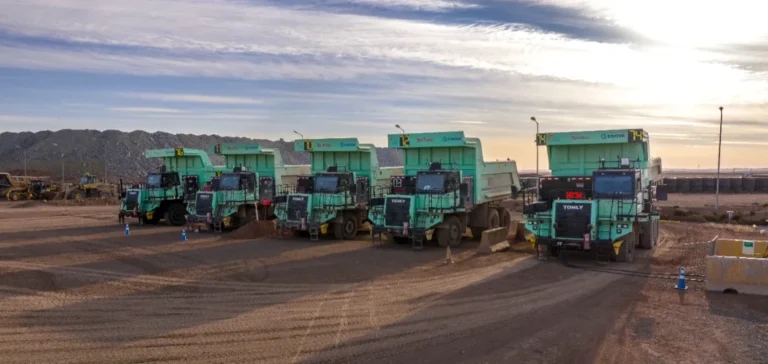Rio Tinto has launched a pilot programme for electric haul trucks with swappable batteries at its Oyu Tolgoi copper mine in southern Mongolia. The project is being carried out in collaboration with Qiyuan Green Power, a subsidiary of Chinese state-owned company State Power Investment Corporation (SPIC). This marks the first deployment of such equipment in surface operations within the mining group.
A complete electric transport system tested on site
The deployed fleet includes eight Tonly trucks, each with a capacity of 91 tonnes, paired with thirteen 800 kilowatt-hour batteries, an automated battery swap station, a static charger and the necessary technical infrastructure. These vehicles will be used to transport topsoil and construct tailings dam structures.
The trial is designed to give Rio Tinto practical experience in operating, maintaining and managing the logistics of a haulage fleet equipped with battery-swapping systems. Testing will continue through to the end of 2026 to assess the feasibility of wider deployment.
Fast-swap system to minimise downtime
The system enables a depleted battery to be replaced by a charged one in under seven minutes, eliminating the need for a fixed charging station. This process significantly reduces vehicle downtime and improves overall operational efficiency.
Rio Tinto currently operates a global fleet of around 700 haul trucks, with approximately 100 belonging to the intermediate capacity class, ranging between 100 and 200 tonnes. This segment is considered suitable for the latest generation of swappable battery technologies.
Sino-Australian industrial partnership in the mining sector
Ben Woffenden, General Manager of Global Equipment and Diesel Transition at Rio Tinto, stated that the pilot project leverages technologies widely used in China. He added that collaboration with partners such as SPIC Qiyuan and Tonly enables the company to rapidly identify viable industrial innovations.
Guo Peng, General Manager of Qiyuan Green Power, said the initiative represents a strategic opportunity to demonstrate the effectiveness of the company’s battery-swapping systems to international mining operators.






















